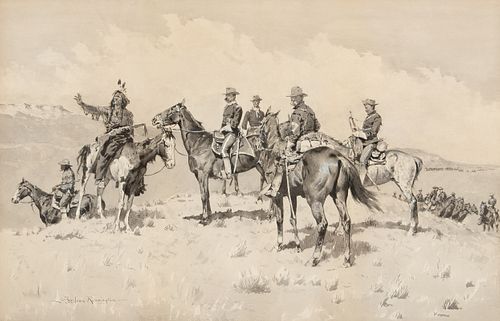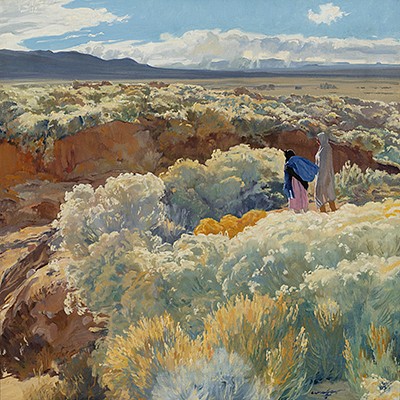Frederic Remington (1861–1909) — The Borderland of the Other Tribe (ca. 1897)
Lot 162
About Seller
Coeur d'Alene Art Auction
11944 North Tracey Road
Hayden, ID 83835
United States
Coeur d’Alene Art Auction specializes in the finest classical Western and American Art representing past masters and outstanding contemporary artists. The auction principals have over 100 years of combined experience in selling fine art and have netted their clients over $325 million in the last fif...Read more
Categories
Estimate:
$200,000 - $300,000
Absentee vs Live bid
Two ways to bid:
- Leave a max absentee bid and the platform will bid on your behalf up to your maximum bid during the live auction.
- Bid live during the auction and your bids will be submitted real-time to the auctioneer.
Bid Increments
| Price | Bid Increment |
|---|---|
| $0 | $100 |
| $2,000 | $250 |
| $5,000 | $500 |
| $10,000 | $1,000 |
| $20,000 | $2,500 |
| $50,000 | $5,000 |
| $100,000 | $10,000 |
| $200,000 | $25,000 |
| $500,000 | $50,000 |
| $1,000,000 | $100,000 |
About Auction
By Coeur d'Alene Art Auction
Jul 31, 2021
Set Reminder
2021-07-31 14:00:00
2021-07-31 14:00:00
America/New_York
Bidsquare
Bidsquare : Fine Western & American Art
https://www.bidsquare.com/auctions/coeur-dalene/fine-western-american-art-7138
The 2021 Coeur d’Alene Art Auction to be held July 31 in Reno, Nevada, will feature 394 selections of unparalleled quality in Western paintings and sculpture from historical and contemporary artists such as Charles M. Russell, Oscar Berninghaus, Walter Ufer, Frank Tenney Johnson, and more. Coeur d'Alene Art Auction info@cdaartauction.com
The 2021 Coeur d’Alene Art Auction to be held July 31 in Reno, Nevada, will feature 394 selections of unparalleled quality in Western paintings and sculpture from historical and contemporary artists such as Charles M. Russell, Oscar Berninghaus, Walter Ufer, Frank Tenney Johnson, and more. Coeur d'Alene Art Auction info@cdaartauction.com
- Lot Description
Frederic Remington (1861–1909)
The Borderland of the Other Tribe (ca. 1897)
ink wash on paper en grisaille
24.5 × 38 inches
signed lower left
VERSO
Label, Whitney Gallery of Western Art, Cody, Wyoming
According to Western art historian Harold McCracken, “Wandering nomads though most of the Plains Indians had been for centuries, the tribes usually had their central villages to which they could return with a homelike feeling; and each had a more or less well defined area that was considered its own territorial domain. The location of these shifted from time to time and the size varied in accordance to the strength and aggressiveness of their warriors, as compared to those of their neighbors. Sometimes the tribes were pushed on by encroachment of stronger enemies and sometimes they moved on to find new hunting grounds or just because of their wandering instinct.
“The borderland of the other tribe marked the edge of their hunting ground. These boundaries were generally well-defined geographical landmarks such as a river or ridge of hills. Out on the open prairie they sometimes erected markers of sun-bleached buffalo skulls or piles of rock. These were a warning and challenge to their enemies and were generally respected by the other tribes. To trespass was considered justification for warfare. When the white man came, and trespassed, he was no exception.”
PROVENANCE
Pete and Janet Taggares, Washington
EXHIBITED
Whitney Gallery of Western Art, Cody, Wyoming, 1974
LITERATURE
Harold McCracken, Frederic Remington: Artist of the Old West, J. B. Lippincott, 1947, plate 36, illustrated
Harold McCracken, The Frederic Remington Book, Doubleday, 1966, p. 151, illustrated
Robert Howard Russell, Drawings by Frederic Remington, R. H. Russell, 1897, illustrated
View more informationAs viewed through glass. Paper appears to be in excellent condition.Condition
- Buyer's Premium



 EUR
EUR CAD
CAD AUD
AUD GBP
GBP MXN
MXN HKD
HKD CNY
CNY MYR
MYR SEK
SEK SGD
SGD CHF
CHF THB
THB













